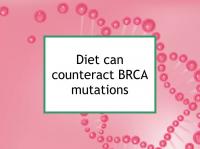Proteins encoded by BRCA tumor suppressor genes (BRCA1 and BRCA2) are used to repair damaged DNA, thereby preserving chromosome integrity during cell division. Defects in this process can cause mutation carriers to have relatively high lifetime risks of developing breast, ovarian and some other cancers.
Some foods and food components have been shown to counteract the effects of detrimental BRCA mutations (please see Foods to eat and avoid for BRCA1 and BRCA2 carriers). Now a new review has summarized the potential roles of dietary polyphenols in counteracting the effects of BRCA1 and BRCA2 mutations. Polyphenols are plant-based micronutrients that may contribute to the color, smell or taste of foods. Examples include curcumin and resveratrol.
Latest research outlines how diet can modify BRCA expression
The review referenced above was designed to examine the role of dietary polyphenols in modifying BRCA gene expression. Such polyphenols can have an important role in pathways involved in cancer progression, influencing the expression of proteins encoded by oncogenes such as p27, p21, p53 and the two BRCA tumor suppressor genes. These genes have roles in apoptosis (programmed cell death), cell cycle arrest (halting progression through the cell cycle), inhibition of proliferation (preventing cell growth and cell division), which in turn promote cancer suppression.
Polyphenols targeting BRCA genes
In the review, the authors discuss the polyphenols below, all of which have been shown to beneficially modify the expression of BRCA genes or appear to have the potential to do so. Epigenetic modifications (alterations in gene expression not caused by changes in the underlying DNA) are the primary mechanisms for influencing BRCA gene expression.
The authors conclude that increasing BRCA gene expression by polyphenols might be a useful strategy in cancer treatment, although the evidence is still limited and further studies are needed.
Please click on any of the polyphenols listed above for important foods that incorporate significant levels, as well as related studies and news stories.
